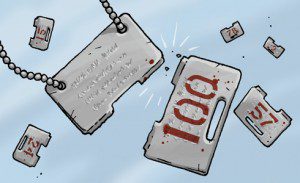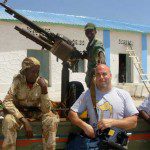Death Watch
With 97 Canadian soldiers already dead in Afghanistan, Morgan Passi finds that just preparing to cover the 100th death stirs emotions among journalists
Lynda Shorten, executive producer for CBC Radio’s As It Happens, exits a news meeting upset. After a wave of deaths among Canadian soldiers in Afghanistan, management at the public broadcaster is asking: What are we going to do for the 100th death?
Almost a month later, I’m in her office. I’ve worked at the show and know Shorten to be a confident woman. Right now, however, she is so bothered by the thought of covering the 100th death that she fumbles her words and cannot look me in the eye. She recognizes the symbolic meaning of 100 but worries about turning a human being into a number. By doing so, she says, “you somehow diminish the death of number 53, 54, number 72, and it turns the death toll in Afghanistan into something approaching a score in a game.”
There’s the irony. Although the death of the 100th Canadian soldier is heartbreaking, it’s also terribly convenient. News organizations have a perfect opportunity to highlight the Afghan crisis. When the death toll breaks the triple-digit barrier, the country will be listening. But with such a captive audience comes the responsibility of covering the 100th soldier’s story without discounting the other 99.
The first Canadian troops arrived in Afghanistan in February 2002. Since then, more than 13,500 soldiers have served in the country and 97 have died. Nine of those deaths took place between August 9 and September 7. Within less than a month, the death toll jumped from the 80s to the high-90s and news organizations were paying attention. Three deaths short of the 100th milestone, it was time to act.
This type of planning is nothing new in an industry that considers the advance obit normal. When celebrities and icons reach a certain calibre (and age), newspapers write obituaries for them in advance. The New York Times, for example, keeps about 1,200 on file, including one from 1982 whose subject has outlived its author. Such preparation is essential for people like the Queen, the Pope and even Apple’s Steve Jobs, whose obit was accidentally published—and then promptly retracted—this summer when a newswire was updating it.
“You’d have to be forehead-slapping naïve to believe that people don’t die,” says Catherine Dunphy, who spent three years writing obituaries for the Toronto Star. She acknowledges many view the advance obit as ghoulish, but says it’s responsible journalism. For most organizations, there hasn’t been much debate over whether to mark the occasion—it’s just what newspapers do. “It is a kind of natural whole number that people always use to pause and reflect on,” says Stephen Northfield, foreign editor at The Globe and Mail. “I guess that’s kind of embedded in your DNA when you’re an editor or writer working in these areas.”
Yet, the 50th garnered little attention. The deaths of six Canadian soldiers on April 8, 2007, were void of any “fifty fanfare,” as the count jumped from 45 to 51.
“It seems kind of uncomfortable and a bit rogue to look forward, but part of our obligation as a news organization is to look forward and try to make sense of these things,” says David Downey, a project, planning and development manager forCBC National Radio News, who began thinking about coverage six months ago.
When the news comes in from Kandahar, CBC Radio will issue a short bulletin announcing the deaths. In addition to feature news pieces, its current affairs shows have made plans too. Between reading the names of the 100 soldiers, The Current will air a documentary that includes a father of a soldier killed in Afghanistan saying every time he hears of another soldier’s death, it takes him back to when his son died.
Nova Scotians can relate. In Halifax, soldiers are a part of everyday life—they are friends, neighbours and coworkers. Four of the first 10 soldiers killed were from the province, and the percentage of casualties from there is higher than the census would suggest.
To mark the 100th death, Halifax’s Chronicle Herald has prepared a photo page with the fallen soldiers’ faces and a feature-length article. Dan Leger, director of news content for the paper and its website, has a frank attitude about its coverage: “It’s a big-ass news story … of vital interest to Canadians and that’s why we’re covering it. And there’s no other ideology behind it.”
His thoughts toward highlighting the number 100 are equally forthright. “There’s always somebody who can say ‘assigning a number to them is just dehumanizing them into numberhood or whatever,’ but fuck it. Every soldier’s got a tag that has a number on it—they don’t mind it.”
Welcome number 100 and with it, dangerous territory. “Probably the single greatest pitfall of this moment is that you can already see the front page,” says Northfield. He admits it may be impossible to avoid turning number 100 into, well, a number. “I don’t think it dehumanizes them, but it turns them into a symbol of something that’s different.” To avoid fixating on that person as a symbol, Northfield says the Globe will broaden its focus to the other 99.
He doesn’t want to “telegraph” the paper’s plans to competitors but states the 100th casualty is an opportunity to capture the longer-term implications of these deaths, and to check in with their friends and families. He also says this isn’t a one-moment event confined to the date the 100th soldier dies.
Shorten’s solution is to do the same with the 100th death as her show has for Canada’s other fallen soldiers. “We’ll probably note it’s the 100th but not make that the focus,” she says. “My dream intro would say, ‘To some people he or she is a number, but to so and so, he was her son.’ Or something like that. So, to take the fact of the numbering and turn it into a story about a human being.”
Meanwhile, news organizations will be waiting—and counting. Unlike that 1982 obit from The New York Times, it’s unlikely the 100th dead soldier will outlive the people preparing for his or her demise.
“It would be astonishing,” says Downey, about the possibility of the 100th death never coming. “It would be absolutely astonishing.”
Listen to journalist Morgan Passi speak about her experiences writing “Death Watch” on the Ryerson Review of Journalism’s Podcast .















